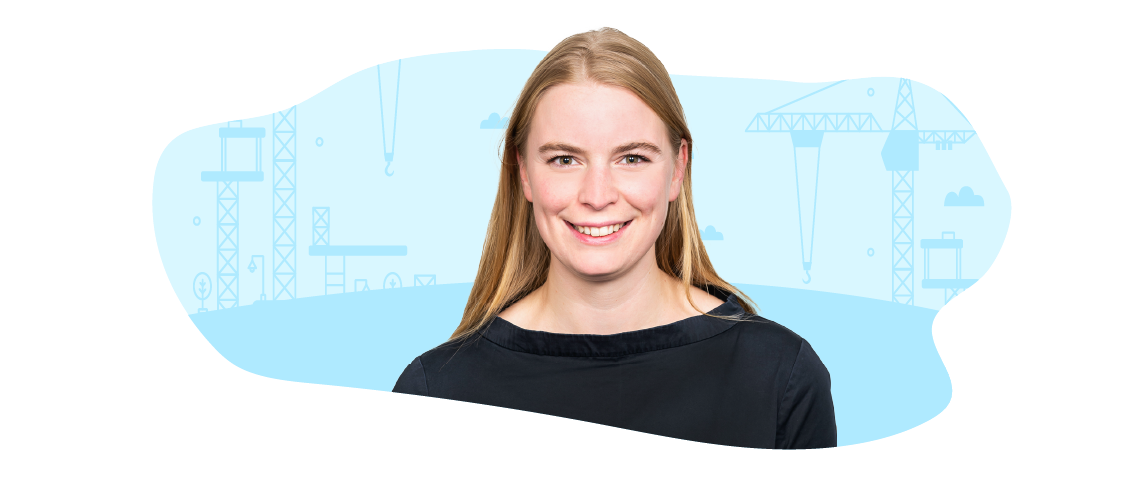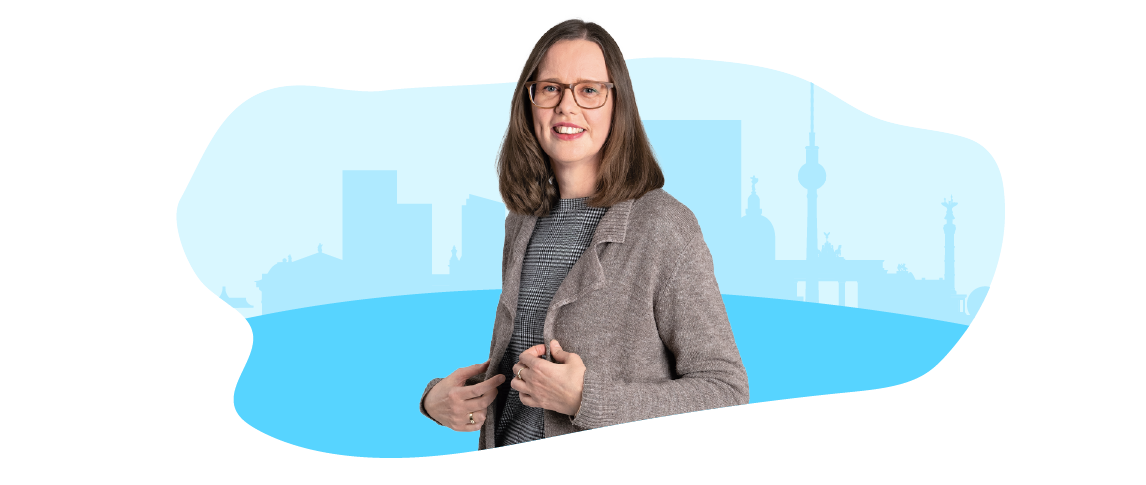"When we develop a new building, we ask ourselves: Who will live here, how will people get around and what do they need for their daily needs?"
PHILIPA WEYERS | HOWOGE consultant for district development new building
The municipal housing association HOWOGE is already planning and building the Fennpfuhl district of tomorrow.
The Berlin housing association HOWOGE asks itself exactly this question. "Our work consists of seeing the quarter as a whole and developing it further as a whole," says Philipa Weyers, HOWOGE consultant for new building quarter development. She is part of a forty-strong team in the new construction department that deals with neighborhood aspects related to new residential construction and has set itself the task of helping to shape the city of the future - including on the Fennpfuhl.

"When we develop a new building, we ask ourselves: Who will live here, how will people get around and what do they need for their daily needs?"
PHILIPA WEYERS | HOWOGE consultant for district development new building
What will be relevant in the coming decades must be designed, built or rebuilt today. The big topics of the time are included: mobility transition, climate, demographic and social change. According to Philipa Weyers, the special task at the Fennpfuhl is to identify the needs of very different groups of residents and to create sustainable offers for each of them. A large proportion of the residents are older people. Among others, those who moved here 50 years ago when the large prefabricated housing estate opened its doors. Half a century later, their children have long since grown up, they themselves are spending their old age at the Fennpfuhl. At the same time, there is a change of tenants. Young families are constantly moving in, students and people from other cultures. All of them have to be thought through.

In this context, the “15-minute city” is a central concept. On foot, by bike or with an e-scooter - everything should be easy and quick to reach: supermarkets, day-care centers, doctors, cafés, care facilities. In the future, owning a car will be insignificant or abolished as a means of transport. "In the long term, we don't need parking spaces and underground garages, but rather mobility points and car-sharing offers," says Philipa Weyers. This led to the idea of using and redesigning the space differently.

With regard to the expansion of the stock, forward-looking forms of living together are being planned. Intergenerational living, for example. Objects in which this is possible are designed in a completely different way than conventional apartment buildings. They have common areas and should be designed to be barrier-free. In order to implement such projects, networks are needed, for example with sponsors. Here, too, it is about thinking beyond the actual living space. What can happen on the ground floors of these houses? “Neighborhood cafés are conceivable, but commercial providers should also move in here. Here it is important to create a good mix,” explains Philipa Weyers. One idea is to settle more crafts in the neighborhood, to create studio apartments to attract creative people who currently prefer more central locations for their workplaces to the neighborhood. "Green space" is also a word that is used frequently. Although the quarter already offers a lot of outdoor space, there should be more of it, which creates quality of life. Climate concepts, such as unsealing options and collecting rainwater, are also included in the planning.

The people who live at the Fennpfuhl should participate in all these change processes. "We don't want to act from our desks," says Philipa Weyers. "That's why we talk to tenants, the tenants' council, the employees of the customer center and the caretakers." For example, Karen Schulz, head of the HOWOGE customer center at Fennpfuhl, has deep insights into the structures of the quarter at Fennpfuhl. Her daily workplace: the HOWOGE high-rise on Anton-Saefkow-Platz. In her opinion, the increasing heterogeneity of the tenants in particular determines the development of the quarter. There is potential here, but there are also challenges. "There are no tenants here," she says. “Some just want to live in peace. Others are happy about offers such as neighborhood meetings. And still others take the scepter into their own hands and think about actions.”
Of course there are also challenges. That's part of the day-to-day business. An example: There were lawsuits in a double high-rise building with the high number of 296 apartments. “The elevators were dirty, it was too loud, there was rubbish in front of the door … The typical everyday problems,” says Karen Schulz. Her many years of experience have taught her and her employees that one thing is important above all: common sense. “We thought about what we can do. And finally decided: Let's just organize consultation hours on site. And that's exactly how we did it. Peace has now returned.” Safety is another major issue at the Fennpfuhl. It is important to Karen Schulz that there are no "anxious dreams", that everything is well lit, that children feel protected. Cleanliness, harmony, security - these are the timeless wishes at the Fennpfuhl, which determine normal life. Probably also in the future...

“We thought about what we can do. And finally decided: Let's just organize consultation hours on site. And that's exactly how we did it. Peace has now returned.”
KAREN SCHULZ | Manager of the HOWOGE customer center at Fennpfuhl
This is one of the reasons why HOWOGE attaches great importance to maintaining communities and building new ones. Because whoever identifies himself also cares. "We can't work miracles," says Karen Schulz. “But we can try to bring people together. That creates connections, and that’s what the neighborhood needs.” And it sounds like a small miracle when she reports on the senior citizens’ club, which has been meeting weekly in the customer center’s conference room for more than ten years – with coffee and cake, in some cases sponsored by HOWOGE. "There was a tight circle. The pensioners organize excursions and even went on vacation together before the outbreak of the corona pandemic. “ Building up more communities and strengthening existing ones will become even more important in view of the progressive mix of tenants. The fact that so many things are going so well is a great motivation for the HOWOGE team at Fennpfuhl. "Most people like living here," says Karen Schulz. And it should stay that way. It's worth being on your feet for that, every day.

For Katja Vollmar, Head of Real Estate Management at HOWOGE, the focus is on people. "We want the neighborhoods to function." Nevertheless, the main task of creating affordable housing must not be pushed into the background. The concerns must be balanced. Katja Vollmar has been working in the housing association since 1995. She is now responsible for construction projects and acquisitions. Energy aspects play a central role in new construction. The stocks should also become climate-friendly in the future. Many of them offer potential for energy-related renovations. In the future, possibilities for generating renewable energy should always be examined. An example of how HOWOGE relies on high quality and innovation when creating living space is the new building on Paul-Zobel-Str. 10 & 10A. Two eight-storey residential buildings were built here on around 4,000 square meters, which enable cross-generational living. After completion in 2019, HOWOGE was awarded the Lichtenberger Builders' Prize in the new construction category for the successful implementation. The jury emphasized the "unmistakable individual identity" of the new building. With the project, “different open spaces were created – for example the protected open space of the day care center and a semi-public space for the residents to stay”.
Incidentally, Katja Vollmar does not only care about the quarter for professional reasons. She grew up at the Fennpfuhl. Her family was one of the first to move here. 11th floor, view of the park. "Girlfriends, school, swimming pool, library - everything was within walking distance," she says. She would like to keep the spirit of security. Identification with the environment is particularly strong among older people. “Today it is important to also create strong anchors for those who have moved here,” she says. These, in turn, enhance the entire district so that it develops radiance beyond its borders. Cultural offers are also conceivable.

"Today it is important to also create strong anchors for those who have moved here."
KATJA VOLMAR | Head of department at HOWOGE real estate management
With regard to the expansion of the stock, forward-looking forms of living together are being planned. Intergenerational living, for example. Objects in which this is possible are designed in a completely different way than conventional apartment buildings. They have common areas and should be designed to be barrier-free. In order to implement such projects, networks are needed, for example with sponsors. Here, too, it is about thinking beyond the actual living space. What can happen on the ground floors of these houses? “Neighborhood cafés are conceivable, but commercial providers should also move in here. Here it is important to create a good mix,” explains Philipa Weyers. One idea is to settle more crafts in the neighborhood, to create studio apartments to attract creative people who currently prefer more central locations for their workplaces to the neighborhood. "Green space" is also a word that is used frequently. Although the quarter already offers a lot of outdoor space, there should be more of it, which creates quality of life. Climate concepts, such as unsealing options and collecting rainwater, are also included in the planning.
Anlässlich des 50. Jubiläums der Grundsteinlegung des Wohngebietes Fennpfuhl fand am 12. Oktober 2022 die „Konferenz 50 Jahre Wohngebiet Fennpfuhl“ statt. Die Dokumentation der Konferenz finden Sie hier zum Download.